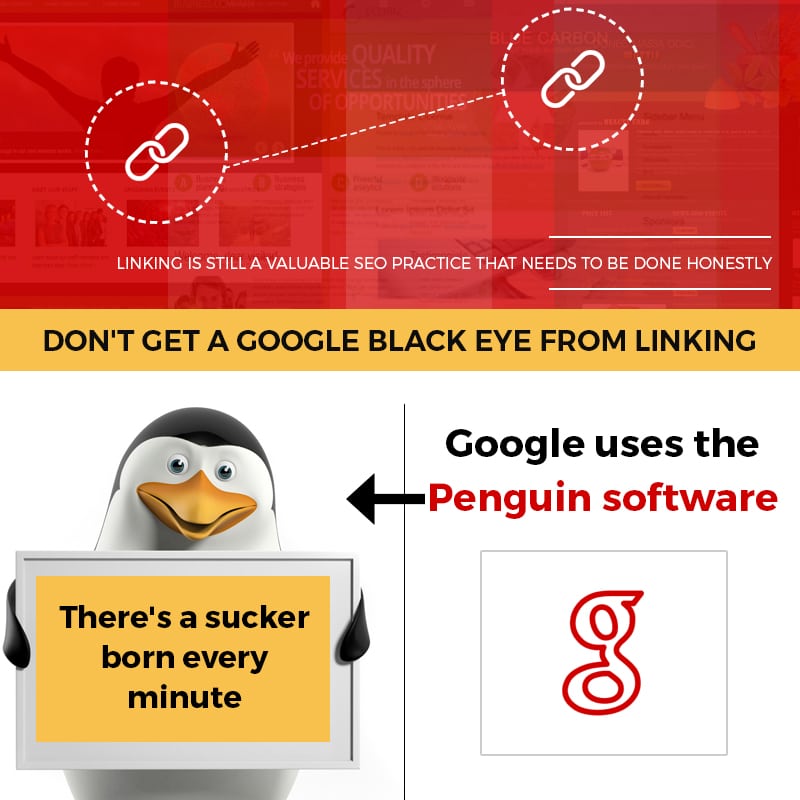 Linking is still a valuable SEO practice but if you do it wrong you’ll be in more trouble than you can dig out of. There are safe and effective ways to manage linking and the bottom line is honesty is the best policy.
Linking is still a valuable SEO practice but if you do it wrong you’ll be in more trouble than you can dig out of. There are safe and effective ways to manage linking and the bottom line is honesty is the best policy.
First of all, Google looks at links to your website using several algorithms, most notably the Penguin software they use. What they’re looking for are links that are useful to the surfer and provide clear cut answers to queries as well as valuable information without interfering with the web surfing experience. Google has had to battle tooth and nail to keep unscrupulous webmasters and web marketers from using technologies that cheated and undermined the integrity of the web. There were vast Black Hat tactics that far too many people fell for and SEO Gurus who swore up and down and charged big money to suckers who thought they would really get top spots on Google. This type of scamming continues to go on just like the late P.T. Barnum said, “There’s a sucker born every minute.” and the way these SEO ripoffs work proves him right.
The honest webmaster, however, can now gain ground so that the playing field is fair and the bad guys are getting slammed. The bad linking practices you should avoid aren’t overwhelming, it just calls for being honorable and applying the techniques correctly.
Never join a linking group or linking ring. Those things are sure enough to get you penalized by Google. Not only that but it may be next to impossible to remove those links to your site and Google is unforgiving in this area. It’s one of those, once you made the mistake it sticks to you like glue, situations.
Having links that are misspelled or full of hype is another way to get the stink eye from Google. Google’s software can detect with advanced AI if text is artificial and full of BS. Yes the good ol’ days are gone for greedy marketers, they now have to work for their money.
Links from low grade authority sites will definitely put you outside tied to the tree. Look for quality links from relative authority sites. Sites with real social networking architectures. Stay away from the boasters who say they can do wonders for you. They can’t. The only wonder they can do for you is get you penalized. You’ll have to keep a sharp eye out for these kinds of SEO linkbuilding solicitors. They know you have money, they know you’re eager, and they’ll try anyway to con you that they can. Some might even friend up to you via social media and look for your weaknesses. It’s because one client could mean a windfall to them so they go that extra mile to hunt you down.
Cleaning up the links on your website can help considerably. Don’t link to sites that link to the con running sites. It’s the old adage, guilt by association. Best to put a post on your blog disavowing the sites that are disreputable that link to you and name names. Google will see you protesting these sites and look at it as a helpful tip to others not to do the same.
Never use Black Hat techniques. Matter of fact don’t use any techniques and tricks at all. Google has tools and tutorials on how to build great SEO on a website and you also have the option of hiring a professional SEO company, one that is recommended by customers and industry heads alike. This way you’ll be steering clear of rough waters. If you do hire an SEO pro, they’ll explain linking to you and you in turn need to make sure that they don’t use Black Hat SEO techniques.
Finally, look at your stats and check on every incoming link to your site as well as outgoing. See what is coming from where and if necessary contact the webmasters of sites that are troublesome and ask them to remove the links to your site. If you’ve bought a site or are looking to buy a site, look at its linking history of present and troubleshoot. Better to have a clean site through rehab than a bad one leading you down the road.
Overall, linking is up to you. Get a professional SEO pro to come in and evaluate your linking status and follow through. You and Google will be good friends from then on.
